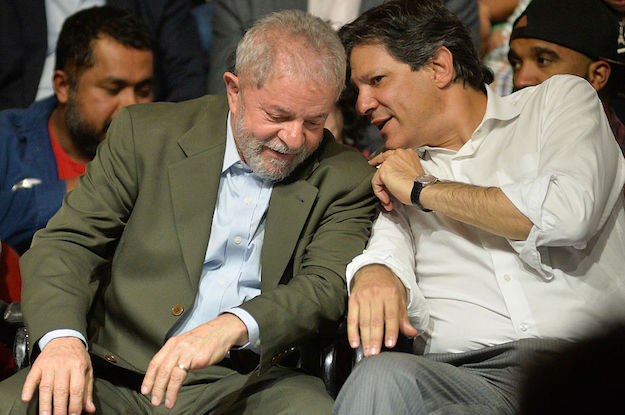As they say in World Cup-winning France: Plus ça change.
Believe it or not, for the eighth consecutive time, it appears Brazil’s presidential election will largely revolve around one man: Luiz Inácio Lula da Silva.
It’s been that way since 1989, when a much younger, more radical version of Lula, wounded by last-minute allegations he encouraged his mistress to abort their child, lost by six percentage points to Fernando Collor. In 1994 and 1998, the success of the inflation-busting Real Plan – and fears Lula was a communist – carried Fernando Henrique Cardoso to overwhelming victories. In 2002 and 2006, a mellower Lula, campaigning on a slogan of “peace and love,” finally won the presidency. His successful two terms gave him the ability to choose his successor, Dilma Rousseff – whom he helped elect twice, in 2010 and 2014.
This time around, Lula, now 72, is very unlikely to be a candidate himself. Brazilian law bars most convicts from running for office, and Lula has been jailed since April on corruption charges. Many Brazilians believed the one-two punch of Rousseff’s 2016 impeachment and Lula’s imprisonment would free them of the “Bearded One” for good. “He is dead, dead, dead,” I heard a well-known São Paulo banker tell a conference late last year, to applause.
But like Arnold Schwarzenegger in the Terminator movies, Lula keeps emerging from the fiery wreckage intact – at least politically. You could write a whole book explaining why, but the essence of it is simple: Lula’s time in office marked the best years of many Brazilians’ lives, especially among the working class. Yes, Brazilians are furious about corruption. But the flagrant criminality seen within President Michel Temer’s government, the uninspiring field of other candidates and the continued struggles of the economy have convinced many Brazilians to give up hoping for a truly clean leader. Might as well go with the devil you know – the one who let you buy your first washing machine, or maybe even a car, back in the 2000s.
Many wags (and wishful thinkers) have insisted Lula’s support would fade once the election drew closer. Instead, Lula’s popularity has continued the steady upward march that started around the time Temer took office, and Lula’s alleged crimes began to seem more banal in comparison. According to several polls over the last month, about 30 percent of Brazilians say they would vote for Lula in October – double the support of the second-place candidate, retired right-wing Army Captain Jair Bolsonaro.
OK, certo, Lula probably can’t run. But a whopping 47 percent of Brazilians told Datafolha in late June they would “certainly” or “possibly” vote for whichever candidate Lula decides to support instead. Let’s say, just to be conservative, that’s only half-true: that Lula manages to rally around 20 percent of voters around his candidate. Even then, in this fragmented field, that’s almost certainly good enough to make a runoff – likely against Bolsonaro.
With all that in mind, the three biggest questions in Brazil’s presidential election as we enter the stretch run are all Lula-centric:
1) Who will Lula support?
Ciro Gomes, a former finance minister, is currently the leading left-ish candidate in the race – with roughly 10 percent support in scenarios where Lula cannot run, good for third place behind Bolsonaro and Marina Silva. If Lula were to endorse Gomes, he would become the favorite not only to make the runoff, but to win the whole thing.
But that seems unlikely – at least in the first round. Lula and his Workers’ Party (PT, for its initials in Portuguese) don’t really trust Gomes, and vice versa, for reasons that go back decades. The PT also wants to field its own presidential candidate to ensure a decent performance in down-ballot races for Congress and governor.
As a result, most observers – including Gomes – believe Lula will pick somebody from his own party. The smart money is on Fernando Haddad, a former PT mayor of São Paulo who was unpopular in office, but is young (55) and moderate enough that he could attract wealthier, urban voters beyond the PT’s working-class base. The other possible pick is Jaques Wagner, a former governor of Bahia.
Many ask: Wouldn’t that just split the left? It could, potentially allowing a centrist like Marina Silva or Geraldo Alckmin to move into the runoff against Bolsonaro. But if we believe the polls, many Brazilians are ready and waiting for instructions from their guru. I would bet that Gomes, despite his recent efforts to build alliances with more centrist parties, will begin to fade the moment Lula makes his pick.
2) Just as critically: When?
The PT has continued to insist that Lula will be their candidate for president. Some may even believe this. But for most it is a charade, albeit a sensible one: The narrative that Lula is a “political prisoner,” barred from running by a hateful elite, is immensely powerful among the party faithful and many others. Episodes such as the attempt by a weekend-duty judge to free Lula on July 8 amount to free campaign publicity. PT leaders, including apparently Lula himself, are eager to continue this fiction as long as possible.
That might be until August 31, when the government begins allotting free time on television for presidential candidates. Such ads remain the main platform by which many Brazilians choose their president, and presumably Lula will want to take advantage of this – especially since Haddad is not nationally known. But alternatively, if Lula wants to pursue the “martyr” narrative to its conclusion, he could force the Supreme Electoral Court to formally reject his candidacy – which probably wouldn’t happen until the first week of September.
Either way, it’s a dangerous game. The first round of the election is October 7. Even in 2010, when Lula was an immensely powerful president with an approval rating nearing 90 percent, it took him several months to communicate to Brazilians that Rousseff was his candidate; she didn’t move into first place until early August in some polls. Lula = Haddad might not sound that complicated, but many Brazilians remain distant from politics, physically and spiritually, and reaching them takes time. Lula’s political instincts are notoriously strong – but remember he’s currently alone in a jail cell in Curitiba. There’s a chance he gets the timing on this one wrong.
3) Will it all backfire?
To be clear, none of what I’ve written above means that Lula (or his candidate) will inevitably win. Indeed, Lula’s ascendancy could merely collide with, and indeed feed, the other major trend in the 2018 election: the anti-establishment, anti-corruption wave against politics-as-usual, which has been most effectively captured to date by Bolsonaro.
The closer Lula gets to the presidency, the better for Bolsonaro. Anti-Lula voters – and there are many of them – will become more fearful, more radicalized, and more willing to overlook Bolsonaro’s numerous, profound flaws. Moderate candidates like Alckmin or Marina Silva, both of them fairly mild personalities, will appear less certain of defeating the perceived “threat.” And that is why, sitting here today, the most likely outcome in October seems like a runoff between Bolsonaro and a leftist candidate with Lula’s blessing – either Haddad or perhaps Gomes. That contest, in turn, seems like a toss-up.
The seemingly inextinguishable influence of Lula in Brazilian elections since 1989 may sound less like Terminator, and more like Groundhog Day. But in truth, it’s one of Latin America’s most enduring, and typical, patterns. A leader who represents the masses and enjoys good economic times – whether of his doing or not – can dominate the political scene for decades, especially if bad times then follow him and draw a sharp contrast. Look at what happened to Juan Perón, whose movement remains central to Argentine politics 66 years after he first became president, and 44 years after his death. Lulismo may just be getting started.









